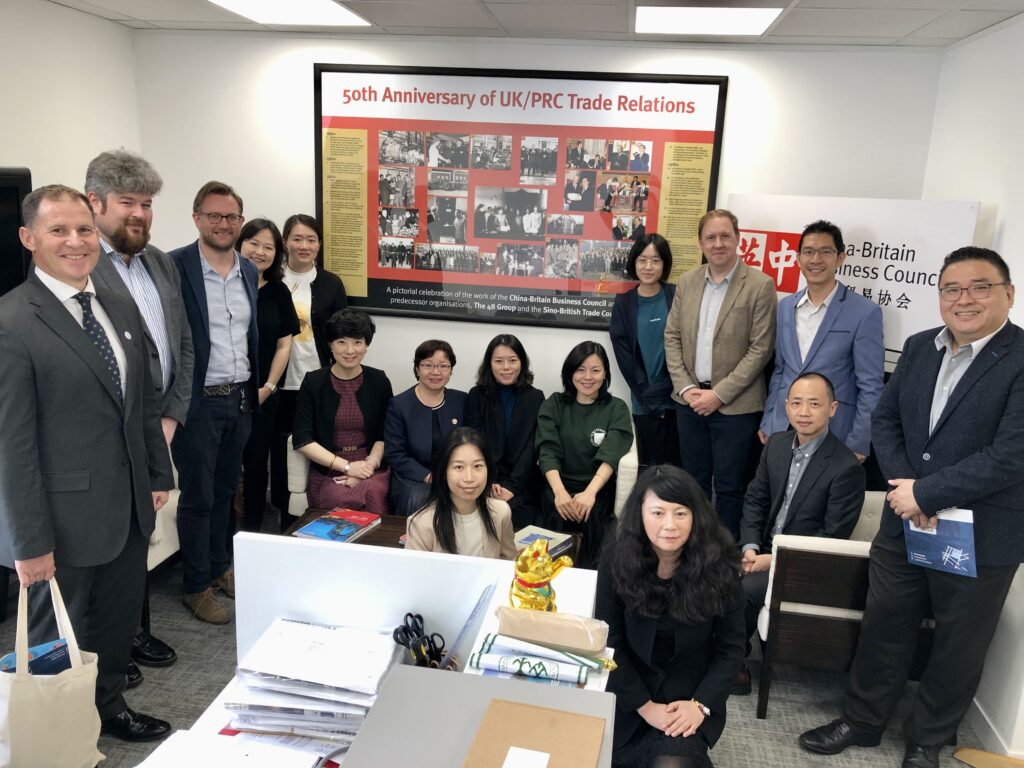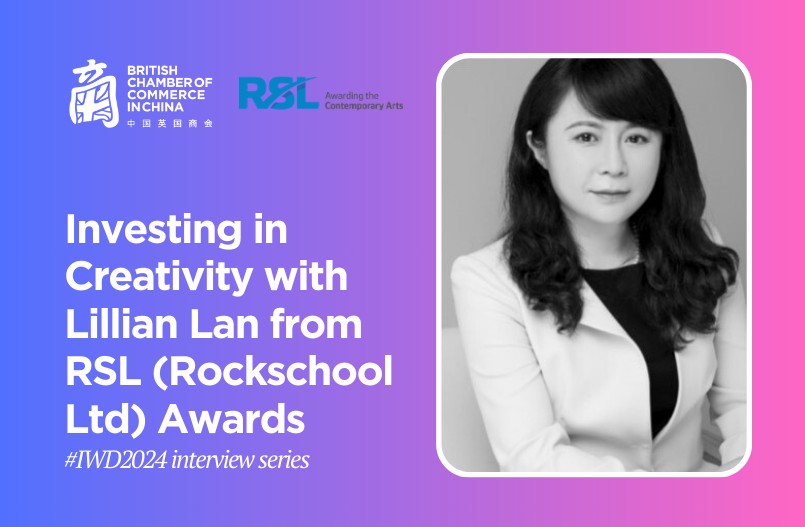This week’s interview with strong women in leadership positions is with Lillian Lan, the vice president of RSL (Rockschool Ltd.). From working in the education, consulting, IT services, and R&D industries, Lillian has gained a wide range of knowledge in business and the tools to deal with challenges that arise. She is an inspirational woman, to say the least. In this interview, we discuss her experiences leading up to taking on a leadership position, the impact of family on your self-confidence, and the qualities she implements in her leadership style.

What is your experience with being in a high leadership position?
“It was a role that I asked for…” “After about 3 years, because we were so successful in China, the head office decided to set up a new company in India and Spain, and it just happened that I noticed who the India manager was, and I knew that he was less experienced… So I thought I should ask for a title, which I had never done before,” she chuckles.
“I had to really think carefully about what I had to write to my boss because my whole company was in the UK and it wasn’t a huge organisation. I emailed the CEO, who was my reporting line, and told her my previous experiences and my income, and then they responded, telling me they would discuss it with the founder. They then decided to give me the title of Vice President, which I feel was more than I asked for.” “I was just asking to be director.” She adds with a little laugh.
“I think I am quite strong to ask for that {the promotion} because the business grew pretty fast and we already surpassed India for being the biggest overseas market after two years of starting the business here [in China].” “You have to ask, and you have to list the facts of what you have given to the business” she emphasises.
It’s an important lesson that we often forget: without asking for what you want, big or small, how will we ever know if it’s a possibility? Lillian emphasises the importance of being proactive and confident in ourselves to ask for what we want, especially as women, as we have less confidence to ask for what we want in the workforce or in any situation in life. Often women struggle to speak up for themselves due to gender biases, cultural expectations, and societal norms, which can affect their confidence in advocating for themselves. Lillian reminds us that it’s important to overcome your fears and highlight your hard work as facts for your employees to achieve what you want in the workplace.
Were you nervous to ask for a promotion?
“I think usually females have less confidence than men… It’s a social impact, especially if you grow up in a school with a very intensive environment, studying with a lot of talented kids, so you always think you are not good enough to do something, so when you really ask for what you want to have, you first have to convince yourself that you deserve it, and you have to believe that, and you will then achieve that. If you are doubtful or shaky about what you want to have, it’s very unlikely you’ll get it. So, you have to believe in it.”
Where did you gain such confidence? Was it from your childhood or something you learnt later in your life?
“It was two things. I started taking music lessons when I was 7 years old, but when I started taking music lessons at 15 years old, I started to have a passion to practice by myself, so I didn’t need teachers or parents to push me anymore. I practiced 8 hours a day during the summer holiday and tried different ways to make myself play better, and then after that summer, I suddenly felt I could conquer everything. There was no difficulty that could push me back because I had overcome my own… I had won myself.”
“Then, the next was when I finished 高考. When I finished the 高考, I thought whatever exams I next took, I’d tell myself that you already passed the 高考, that’s the most difficult exam in China.” The most important thing, Lillian firmly says, is that “you have to conquer yourself” and your own fears first.
She goes on to speak about the “dark power” women have once a month—their period—and how that affects her judgment and mindset. “When you have your period, you have the dark power over your head once a month, so when you have menopause, it’s two or three times a week, and that will destroy your whole judgement and mind. So then I spoke to a therapist, whom I found really helpful. She won’t give me any judgment, but she’ll try to inspire me to reflect on my feelings…I also read books on how to motivate yourself, and all these helped, I think. You have to ask for help through books, therapists, or life coaches so that you can build your confidence.”
Lillian mentions the confidence you lose as you get older; life gets thrown at you, and you have to learn how to rebuild that confidence you had when you were starting out. “When you get older, you have a lot of past experiences, but when you are 40, you have your own difficulties and challenges, and you start to push yourself back, so you have to rebuild your confidence to know that you deserve to have the best thing.”
“I think many women who have children lose themselves. They will change their identity to being mothers. It’s difficult because they will try to copy what their mum’s have done.”
Lillian describes the long-lasting impact of her childhood as she alludes to the consequences that controlling parenting can have on your confidence and self-identity later in life. “I think, especially when your parents are very overprotective when you’re looking for a boyfriend as a teenager, in China, it’s still prohibited… Students are not allowed to date in middle school. Maybe now it’s more open, but during my time, it was strictly prohibited, and there are no correct guidelines to tell you what you need to be aware of. As a girl, you have a bottom line when you are dealing with boys, but nobody tells you how to deal with it. “That really impacted me” she says. She described how she’d bring back her male friends to her house just to see how her parents would react. “To just test them… it wasn’t my boyfriend, just a good friend, but it was to test them.” “Every boy I brought home wasn’t approved.” She goes on to speak about the different standards given to boys and girls when it comes to relationships.“One time in middle school, my friend told me that families will encourage the boy to look for girls, but for girls, you aren’t allowed to look.” “The traditional social value is still quite strong, maybe in smaller places rather than bigger cities.”
Do you think that affected your self-confidence later in life?
“It did, but I try to stay away from my family as far as possible.” She laughs. “I left their home at 18 for university, and I stayed away, got a boyfriend, got married, and lived independently. After 7 years, I divorced, and I still live independently”.“The power of your family is quite strong, and its not something you can be self-aware of; it can only be developed with the help of your therapist.” “It’s a very long-lasting impact… even though I live very far from them, I can still feel that impact.”
It’s no secret that your childhood can have significant impacts on you in your later life. Especially as a woman, growing up with double standards and specific ideas of how you should behave can lead to internalising societal expectations, leading to feelings of inadequacy or pressure to conform. It’s crucial we continue to raise awareness on these issues and challenge double standards placed on women so that we can create a more inclusive and empowering environment in and out of the workplace.

How did you approach your leadership position when you started?
“I think my job requirements didn’t change when my work title changed because it was a small organisation and I already had management experience… I just wasn’t very confident enough to ask for the management title in the very beginning, so it took some time to convince myself I could do this job.”
“But I did see In my previous job at IVM, there were some women leaders promoted to partner level, but they were not confident enough to take the role, and then they got lower performance evaluation ratings, and they then had to leave the company. So, I think when you are ready and you think that it is not fair that you haven’t been promoted, then you have to separate your emotional feeling of the unfairness and put the facts on the table of why you deserve it.”
What are some important qualities you implement in your leadership style?
“Always respect your employees, and do not overuse your power in your leadership role.” “In the private companies, at the beginning of my career, I experienced this[mistreatment].” Lillian mentions that she experienced this mistreatment of power at the beginning of her career, which led her to make sure she would never do the same if she reached a leadership position.
“At RSL, we only have two staff, and they’re both women. For them, what I can do is set the boundary very clearly because it’s a small organisation.” Lillian emphasises the importance of creating boundaries in the workplace and employers with more authority respecting those boundaries. “As far as I know, some of my business partners treat their staff like family members… It sounds sweet, but actually, it’s not. You have to set very clear boundaries between employees and employers.”
“You can’t ask your employees to work overtime for free. You can ask a family member to come to you at midnight; you cannot ask your staff to do that. When you tell your employer you are on leave, you can’t call them back for a team-building event; you can’t take advantage of staff. I think that’s one very important thing.” “If you find the company culture unhealthy, you have to leave it,” she firmly says.
As a woman in a leadership role, how did you avoid feelings of mistreatment in the work environment as a result of your gender?
“Last year I had a very tough time with my boss; he was in the UK, and I think he just didn’t understand what was happening in China because they hadn’t come to China in 3 years. In business discussions, I’d say that I needed certain things that they couldn’t understand. so I thought: ‘am I being abused by the boys?’ So that naturally came into my mind. I spoke to my therapist about it.
“Even with my previous female boss in the UK, I had the same feeling. Since she was female, the thought arose in my mind: Maybe she doesn’t like Chinese people, she has this premonition about Chinese people, so I was a little mad at the time.”
“I spoke to my therapist about it, and my therapist asked, ‘Where did that idea come from?’” She laughed. She praises her therapy sessions for helping her with this over thinking and small voice in the back of my mind. ’is it because I’m a woman?’ ‘Is it because I’m Chinese?’ Lillian says that women “need one week to come down… female’s emotions are like a wave; they go up and down, up and down.”

What is some advice you have for the younger generation on building their confidence to pursue their passion?
Throughout the interview, Lillian praised the significance of going to therapy for her self-confidence. “Therapists will help you rebuild a new mindset and the way you look at the world.” “Looking for a therapist can be very costly, so there are also some good books you can read.” However, Lillian advises that when reading self-help books, you have to constantly think about it every day and implement it into your life; otherwise, you’ll forget about it.
“The most important thing is to know what the worst scenario would be, and if that happens, do you know how to cope with it? Then you will think it’s not that scary and you can handle it… Not everyone wants to think of the worst scenario; however, you have to push yourself to think of that.”
Lillian highlights the importance of taking the time to understand the challenges women go through both internally and externally as a collective society. Can we then move towards a more equal and inclusive environment? By challenging biases, inspiring inclusivity, and progressing change, we can pave the way for a future where every person, regardless of gender, can feel empowered to pursue their passion.


